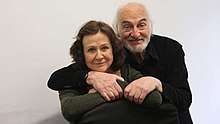Héctor Alterio
| Héctor Alterio | |
|---|---|
 Julieta Serrano and Héctor Alterio in 2011 | |
| Born |
21 September 1929 Buenos Aires, Argentina |
| Occupation | Actor |
| Spouse(s) |
Angela Bacaicoa (m. 1969) |
| Children |
Ernesto Alterio Malena Alterio |
Héctor Benjamín Alterio Onorato (born 21 September 1929) is an Argentine theatre, film and television actor, well known both in Argentina and Spain.[1]
Biography
Alterio's theatre debut came in 1948 as the lead in Cómo suicidarse en primavera ("How to commit suicide in spring"). After finishing drama school, he created the Nuevo Teatro ("New Theatre") company in 1950, where he worked until 1968 and helped change the Argentine theatrical scene of the 1960s.
He also worked in the Argentine cinema. His debut on the silver screen took place in Alfredo Mathé's Todo sol es amargo (Every sun is bitter) in 1965. He then participated in many of the most important Argentine movies of the 1970s, including La Patagonia rebelde (The Rebel Patagonia), which was awarded a Silver Bear at the 24th Berlin International Film Festival.[2] His voice was used in Ya es tiempo de violencia (1969), an anonymous film about the Cordobazo riots which took place the same year. The film was produced by Enrique Juárez, close to the Grupo Cine Liberación.
While in Spain in 1975, he received death threats from the Argentine Anticommunist Alliance. He decided not to return to Argentina and remained in exile.
Consequently, Alterio began to work in Spanish films, including A un dios desconocido (1977) and received the Best Actor award at the Donostia-San Sebastián International Film Festival, and El nido (1980), and for his effort received the Best Actor award from the Association of Latin Entertainment Critics in 1983.
After the restoration of democracy in Argentina in 1982, Alterio worked in films produced in both countries and some co-productions.
In 2004 he received an Honorary Goya Award for his lifetime body of works.
Roles in Academy Award-nominated films
Héctor Alterio has been in five Oscar-nominated as Best Foreign Language Film pictures:
- The Truce – (1974)
- The Nest – (1980)
- Camila – (1984)
- The Official Story – (1985)
- Son of the Bride – (2001)
The fourth of them won the award in the 58th Academy Awards, and was also nominated as Best Original Screenplay. All of these films, except for The Nest, which was submitted by Spain, has been submitted to the awards by Argentina.
Filmography
- Awaking from a Dream (2008)
- Semen, una historia de amor (2005)
- Cleopatra (2003)
- El Último tren (2002)
- Kamchatka (2002)
- Apasionados (2002)
- Nobel (2001)
- El hijo de la novia (2001)
- Plata quemada (2000)
- Los libros y la noche (2000)
- Esperando al Mesías (2000)
- Un dulce olor a muerte (1999)
- Suenas en la mitad del mundo – Cuentos ecuatorianos (1999)
- La mujer más fea del mundo (1999)
- Las huellas borradas (1999)
- Pequeños milagros (1998)
- Cenizas del paraíso (1997)
- Caballos salvajes (1995)
- King of the River (1995)
- El detective y la muerte (1994)
- Tanguito (1993)
- Don Juan in Hell (1991)
- Yo, la peor de todas (1990)
- Gentile Alouette (1990)
- El verano del potro (1989)
- El hombre de la deuda externa (1987)
- Barbablu Barbablu (1987)
- Sofía (1987)
- Mi General (1987)
- Manuel y Clemente (1986)
- Puzzle (1986)
- Contar hasta diez (1986)
- A la pálida luz de la Luna (1986)
- Los chicos de la guerra (1985)
- Adiós, Roberto (1985)
- La historia oficial (1985)
- Flesh + Blood (1985)
- El señor Galíndez (1984)
- De grens (1984)
- Camila (1984)
- La mujer del juez (1983)
- Il quartetto Basileus (1982)
- Asesinato en el Comité Central (1982)
- Corazón de papel (1982)
- Antonieta (1982)
- Volver (1982)
- Kargus (1981)
- Los viernes de la eternidad (1981)
- Tac-Tac (1981)
- El crimen de Cuenca (1980)
- El Nido (1980)
- Tiro al aire (1980)
- Marian (1979)
- Memorias de Leticia Valle (1979)
- Serenata a la luz de la Luna (1979)
- Tres en... (1979)
- Las truchas (1978)
- ¿Qué hace una chica como tú en un sitio como éste? (1978)
- Tiempos de constitución (1978)
- Arriba Hazaña (1978)
- Asignatura pendiente (1977)
- A un dios desconocido (1977)
- Las palabras de Max (1977)
- La guerra de papá (1977)
- Pascual Duarte (1976)
- Cría Cuervos (1976)
- La tregua (1974)
- La Patagonia rebelde (1974)
- Los siete locos (1973)
- Quebracho (1973)
- La mafia (1972)
- El santo de la espada (1970)
- Don Segundo Sombra (1969)
- Todo sol es amargo (1965)
Awards
Won:[3]
- Goya Awards: Lifetime Achievement Honorary Award, 2004.
- Cinema Writers Circle Awards: CEC Award Best Supporting Actor, for El Hijo de la novia, 2002, Spain.
- Valladolid International Film Festival: Best Actor, for El Último tren, 2002.
- Association of Latin Entertainment Critics: Best Actor, for El nido, 1980.[4]
- Donostia-San Sebastián International Film Festival: Prize San Sebastián, Best Actor, for A un dios desconocido, 1977.
- Argentine Film Critics Association Awards: Silver Condor for Best Supporting Actor for La maffia, 1973.
Nominated
- Argentine Film Critics Association Awards: Nominated for four Silver Condors (1998, 2001, 2002, and 2003).
References
- ↑ Héctor Alterio at the Internet Movie Database.
- ↑ "Berlinale 1974: Prize Winners". berlinale.de. Retrieved 2010-07-03.
- ↑ IMDb film data base, awards section.
- ↑ New York Latin ACE Awards Archived 2007-02-06 at the Wayback Machine. web page. Last accessed: 2007-01-28.
External links
| Wikimedia Commons has media related to Héctor Alterio. |
- Héctor Alterio at Cinenacional.com (in Spanish)
- Allocine biography (in French)